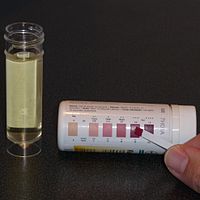
Photo from wikipedia
Diseases, disorders, and insults of aging are frequently studied in otherwise healthy animal models despite rampant co-morbidities and exposures among the human population. Stressor exposures can increase neuroinflammation and augment… Click to show full abstract
Diseases, disorders, and insults of aging are frequently studied in otherwise healthy animal models despite rampant co-morbidities and exposures among the human population. Stressor exposures can increase neuroinflammation and augment the inflammatory response following a challenge. The impact of dietary exposure on baseline neural function and behavior has gained attention; in particular, a diet high in fructose can increase activation of the hypothalamic-pituitary-adrenal axis and alter behavior. The current study considers the implications of a diet high in fructose for neuroinflammation and outcomes following the cerebrovascular challenge of stroke. Ischemic injury may come as a "second hit" to pre-existing metabolic pathology, exacerbating inflammatory and behavioral sequelae. This study assesses the neuroinflammatory consequences of a peri-adolescent high-fructose diet model and assesses the impact of diet-induced metabolic dysfunction on behavioral and neuropathological outcomes after middle cerebral artery occlusion. We demonstrate that consumption of a high-fructose diet initiated during adolescent development increases brain complement expression, elevates plasma TNFα and serum corticosterone, and promotes depressive-like behavior. Despite these adverse effects of diet exposure, peri-adolescent fructose consumption did not exacerbate neurological behaviors or lesion volume after middle cerebral artery occlusion.
Journal Title: Brain, Behavior, and Immunity
Year Published: 2018
Link to full text (if available)
Share on Social Media: Sign Up to like & get
recommendations!